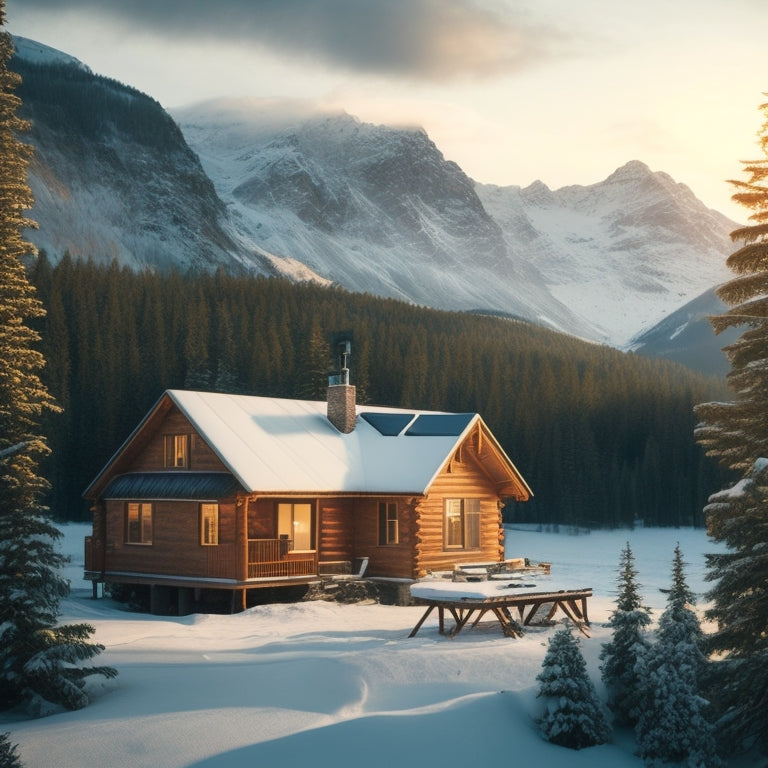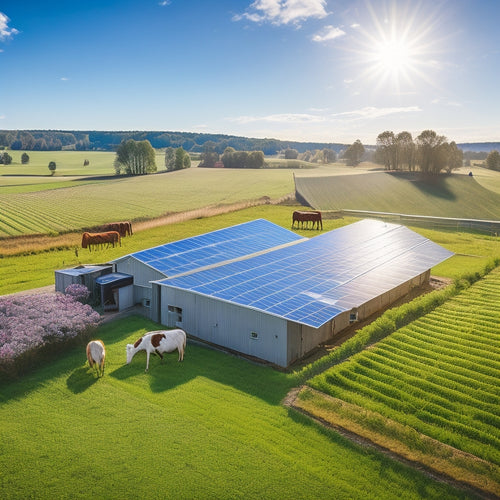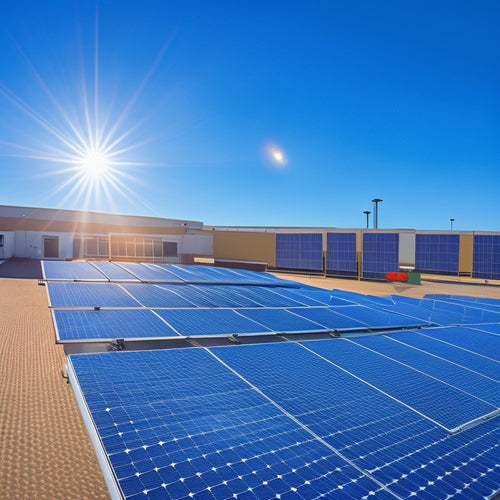
Buying Solar Power Systems for Off-Grid Cabins
Share
You're looking to outfit your off-grid cabin with a reliable solar power system. To guarantee a cost-effective and efficient energy solution, you'll need to carefully select components that meet your unique energy needs. Start by choosing solar panels with high efficiency ratings and durable deep cycle batteries that can handle your cabin's energy demands. Don't forget to select compatible inverters and charge controllers, as well as a sturdy mounting and tracking system. Once you've got the basics covered, you can fine-tune your system's performance by implementing energy-efficient practices and optimizing your cabin's energy usage. Now, it's time to tailor a system that truly fits your off-grid lifestyle.
Key Takeaways
• Evaluate solar panels with high efficiency ratings above 20% and durable constructions to withstand environmental conditions.
• Select deep cycle batteries prioritizing cycle life, adequate capacity, and minimal maintenance requirements for reliable energy storage.
• Choose high-efficiency inverters above 95% and compatible charge controllers to ensure stable AC output and prevent overcharging.
• Opt for adjustable, corrosion-resistant mounting and tracking systems that blend with cabin design for optimal energy output.
• Size the solar power system according to cabin energy demands, local solar resources, and energy-efficient practices to minimize consumption.
Choosing the Right Solar Panel
When selecting a solar panel for your off-grid cabin, consider the wattage and voltage requirements of your system, as well as the panel's durability and resistance to harsh environmental conditions. You'll want a panel that can withstand the elements and provide reliable power.
Efficiency ratings are critical, as they determine how much energy your panel can generate per hour of sunlight. Look for panels with high efficiency ratings, typically above 20%. This guarantees you get the most power from your available roof space.
Warranty options are also vital. A thorough warranty can provide peace of mind and protect your investment. Opt for a panel with a warranty that covers performance, materials, and workmanship for at least 25 years. Some manufacturers offer extended warranties, which can provide additional security. Be sure to review the warranty terms and conditions to understand what's covered and for how long.
Selecting Deep Cycle Batteries
You'll need deep cycle batteries that can store excess energy generated by your solar panels during the day for use at night or on cloudy days, and selecting the right ones is critical to making sure your off-grid cabin remains powered.
When choosing deep cycle batteries, consider the following key factors:
-
Cycle Life: Look for batteries with a high cycle life, as this determines how many charge/discharge cycles the battery can handle before its capacity starts to degrade.
-
Capacity: Select batteries with a sufficient capacity to meet your energy needs, taking into account your cabin's energy usage and the amount of energy generated by your solar panels.
-
Battery Type: Decide between flooded lead-acid, sealed lead-acid, or lithium-ion batteries, each with their own advantages and disadvantages.
- Battery Maintenance: Consider batteries that require minimal maintenance, such as sealed or maintenance-free batteries, to reduce upkeep tasks and ensure top-notch performance.
Inverters and Charge Controllers
Your off-grid cabin's solar power system relies on inverters and charge controllers to convert and regulate the energy generated by your solar panels, ensuring a stable and efficient power supply. These components play an essential role in maximizing your system's performance and minimizing energy losses.
When selecting an inverter, look for high inverter efficiency, typically above 95%, to minimize energy losses and heat generation. A high-efficiency inverter will provide a stable AC output, allowing you to power your cabin's appliances reliably.
When choosing a charge controller, make sure it's compatible with your solar panel array and battery bank. A compatible controller will optimize energy harvesting, prevent overcharging, and prolong the lifespan of your batteries. Consider a controller with built-in monitoring capabilities to track your system's performance and identify potential issues.
Mounting and Tracking Systems
Properly mounting and tracking your solar panels is crucial to guarantee maximum energy harvesting, as even slight misalignments can greatly impact your off-grid cabin's power supply. You'll want to confirm that your mounting system provides structural integrity to withstand various environmental conditions, such as heavy snow loads or strong winds.
When selecting a mounting system, consider the following key factors:
-
Durability: Choose a system made from high-quality, corrosion-resistant materials that can withstand harsh outdoor conditions.
-
Adjustability: Opt for a system that allows for easy adjustments to optimize energy output throughout the year.
-
Aesthetics Considerations: Select a mounting system that blends seamlessly with your cabin's design and doesn't compromise its appearance.
- Customization: Consider a system that can be tailored to your cabin's unique architecture and solar panel configuration.
Cabin-Specific System Sizing Tips
To guarantee your off-grid cabin's energy independence, accurately sizing your solar power system requires a thorough understanding of your cabin's unique energy demands and local solar resources. You must consider the cabin's load, including appliances, lighting, and heating/cooling systems, to determine the total energy requirement.
| Energy Efficiency Tips | Benefits |
| Reduce lighting wattage | Lower energy consumption |
| Upgrade to energy-efficient appliances | Reduced energy demand |
| Insulate your cabin | Reduced heating/cooling needs |
| Implement a timer for non-essential loads | Optimized energy usage |
Frequently Asked Questions
Can I Use Solar Power for Heating and Cooling My Cabin?
You can harness solar power for heating and cooling your cabin by leveraging thermal mass and insulation strategies, where solar-heated fluids warm your space during winter, and shaded windows reduce heat gain in summer.
Do I Need a Backup Generator for Cloudy or Low-Sun Days?
'When relying on solar power, you'll need a backup generator for cloudy or low-sun days to guarantee power reliability, especially if your battery capacity is limited, to avoid energy shortages and system downtime.'
How Often Should I Clean My Solar Panels to Maintain Efficiency?
Imagine your solar panels as a pristine garden, where dust and debris are weeds choking efficiency; you'll need to tend to them regularly, inspecting panels every 6-12 months and cleaning them every 3-6 months to maintain peak energy harvest.
Are Solar Power Systems Compatible With Existing Cabin Electrical Systems?
When integrating a solar power system, you'll want to guarantee system integration with your existing cabin electrical system, achieving electrical harmony by matching voltage, current, and frequency to avoid compatibility issues and ensure seamless power flow.
Can I Expand My Solar Power System if My Energy Needs Increase?
'Take the bull by the horns' and future-proof your solar power system! As your energy demands increase, you can upgrade your system in phases, adding more panels or batteries to meet growing energy needs, ensuring a seamless and efficient progression.
Related Posts
-

What Do I Need to Know About Farm Solar Panels
When considering farm solar panels, you need to assess costs, benefits, and technical specifics. Initial investment c...
-

Solar Phone Chargers for Camping Essentials
Solar phone chargers are must-haves for your camping essentials, allowing you to stay connected while enjoying nature...
-

Essential Solar Panel Mounts for Commercial Properties
When it comes to essential solar panel mounts for your commercial property, durability and wind resistance are key fa...


